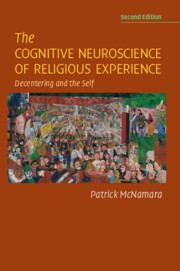Book contents
- The Cognitive Neuroscience of Religious Experience
- The Cognitive Neuroscience of Religious Experience
- Copyright page
- Dedication
- Contents
- Preface to Second Edition
- Acknowledgments
- Chapter 1 Introduction
- Chapter 2 On Decentering
- Chapter 3 On the Self and the Divided Self
- Chapter 4 The Cultural and Evolutionary Background to the Neuroscience of Religion
- Chapter 5 Neurology of Religious Experiences
- Chapter 6 Psychedelics and Religious Experiences
- Chapter 7 Mystical Experiences
- Chapter 8 Religious Experiences and Transformative Experiences
- Chapter 9 Supernatural Agents and God Concepts
- Chapter 10 Ritual
- Chapter 11 Religious Language
- Chapter 12 Group Effects and Religion
- References
- Index
Chapter 12 - Group Effects and Religion
Published online by Cambridge University Press: 02 June 2022
- The Cognitive Neuroscience of Religious Experience
- The Cognitive Neuroscience of Religious Experience
- Copyright page
- Dedication
- Contents
- Preface to Second Edition
- Acknowledgments
- Chapter 1 Introduction
- Chapter 2 On Decentering
- Chapter 3 On the Self and the Divided Self
- Chapter 4 The Cultural and Evolutionary Background to the Neuroscience of Religion
- Chapter 5 Neurology of Religious Experiences
- Chapter 6 Psychedelics and Religious Experiences
- Chapter 7 Mystical Experiences
- Chapter 8 Religious Experiences and Transformative Experiences
- Chapter 9 Supernatural Agents and God Concepts
- Chapter 10 Ritual
- Chapter 11 Religious Language
- Chapter 12 Group Effects and Religion
- References
- Index
Summary
In chapter 12 we examine the groupishness of religion. Sexual conflict theory suggests that ancient feamle dispersal patterns meant that women found themselves in low trust environments while men remained among genetic relatives. Males therefore formed task-oriented groups and religious consciousness while females tended to form and generate moralizing and punihsing ideologies.
Keywords
- Type
- Chapter
- Information
- The Cognitive Neuroscience of Religious ExperienceDecentering and the Self, pp. 223 - 237Publisher: Cambridge University PressPrint publication year: 2022

